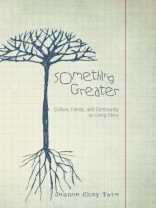Every day, Americans rub shoulders with the cultures of the world–on the sidewalks of their cities and, increasingly, in small towns and rural areas. As civil discourse becomes increasingly divisive, many long for our nation to better deal with its diversity. Yet Americans also wonder how far the nation can stretch to embrace diversity and still maintain an identity. Ethnic and faith communities, Americans of many varieties, share a fear of losing their traditions. Will the next generation still honor the values of caring for others and contributing to community life?
The psychology of individualism that underlies American life is no longer adequate to guide a future filled with diversity. America’s children may have wings to soar into the future, but they lack roots connecting them to a shared heritage. Something Greater explores the impact of individualism on American child-rearing practices, and its inability to deal with diversity while sustaining life together in families and communities. By contrasting the intergenerational values of biblical and Chinese communities and current infant research with her own experiences in San Francisco’s Chinatown, the author reveals how the living stories of heritage that lie at the heart of human development speak to a deep American hunger for shared values and connectedness in family and community.
Mengenai Pengarang
Jeanne Choy Tate is an author, early childhood educator, multicultural curriculum developer, and lay pastor. Her book, Something Greater: Culture, Family and Community as Living Story, was recently awarded third place in the Presbyterian Writers Guild ‘First Book’ competition. Building on personal experiences in San Francisco’s Chinese American community, Jeanne Choy Tate explores the intergenerational childrearing of biblical and Chinese communities as a contrast to America’s individualism. At age 19, Jeannie crossed the American continent to ‘find her identity’ as a live-in volunteer at Cameron House in San Francisco’s Chinatown. Later, as a bilingual/bicultural early-childhood educator, she discovered the interdependent values of Chinese culture to be, in many ways, closer to the values of early biblical communities than modern individualism. These experiences inspired an MA with Robert Bellah and a Ph D at the Graduate Theological Union. Building on her experiences as a Presbyterian lay pastor, partner in a biracial marriage, and parent of a bicultural child, Tate writes of life lived on the borders, in the tension between individual and community, between the longing to belong and being one’s self. She explores how living stories of culture and faith, dynamic and filled with diversity, create healthy families, bind a society together and speak to the deep hunger of Americans who long to find meaning in something greater than the individual self.












